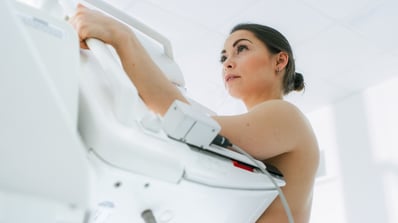Breast Cancer Risk Factors
Breast Cancer
- Breast Cancer Overview
- Newly Diagnosed
- Signs & Symptoms
- Detecting & Diagnosing
- Types of Breast Cancer
- Hormone Receptor Status
- Lymph Node Involvement
- Staging
- Treatment Options
- Breast Cancer Surgery
- Breast Cancer Recurrence
- Breast Reconstruction
- Risk Factors
- Genetics & Breast Cancer
- Breast Cancer FAQs
- Living as a Survivor
If you are a woman, you are at risk of developing breast cancer. The National Cancer Institute estimates that one in eight women in the United States will develop breast cancer in their lifetime. Unfortunately, there is no way to prevent the disease completely, but there are steps you can take to reduce your risks of developing breast cancer.
A risk factor is anything that increases your chance of developing cancer. While risk factors often influence the development of cancer, most do not directly cause cancer. Some people with several risk factors never develop cancer, while others with no known risk factors do. Certain risk factors of breast cancer can be controlled while others cannot.
Risk Factors for Breast Cancer That Are Within Your Control
There are lifestyle choices that can influence some breast cancer risks. This means they involve personal behaviors and the choices you make. If you’re concerned about developing breast cancer, you can make changes to reduce your risk. Below are common lifestyle risk factors – and how you can reduce them.
- Alcohol consumption. How much alcohol you drink can increase the risk of developing breast cancer. To reduce your risk, the American Cancer Society recommends no more than one drink a day for women (2 a day for men).
- Being overweight. Your breast cancer risk increases if you are overweight or obese after menopause. Excess body fat is associated with increased estrogen and blood insulin levels in women, which has been associated with breast cancer.
- Birth control. Certain forms of birth control (including oral contraceptives) have been linked to a slightly higher risk of developing breast cancer. To reduce this risk, talk to your doctor about other forms of non-hormonal contraception (such as IUD or condoms).
- Timing and frequency of pregnancy. According to the American Cancer Society, women with multiple children and women who have a baby before age 30 have a slightly lower risk of breast cancer. Furthermore, according to the National Cancer Institute, if you give birth at any age, breastfeeding your baby for at least a year can reduce your risk of developing breast cancer.
Risk Factors for Breast Cancer That Are Out of Your Control
In some cases, risk factors are based on your genes, meaning you were born with them (inherited). Genetic risk factors of breast cancer can include:
- Gender. Women are 100 times more likely than men to develop breast cancer.
- Age. Women aged 55 or older have the highest risk of developing invasive breast cancer.
- Race and ethnicity. White women are more likely to develop breast cancer than black women. However, among women younger than 45 years of age, black women are more susceptible to developing the disease than white women. Women of Ashkenazi or Eastern European Jewish heritage also have an increased risk of breast cancer because they may be more likely to have inherited a BRCA gene mutation.
- Personal history of breast cancer. It is possible that you can develop breast cancer again if you have been previously diagnosed with it.
- Family history of breast cancer or known inherited gene mutations. If any women in your immediate family (such as a grandmother, mother, aunt, sister, daughter, or cousin) have been diagnosed with breast cancer, you may consider learning more about genetic testing. Genetic testing can be done to determine if you are at a higher risk of developing breast cancer. Consider making an appointment to talk with a genetic counselor if you are concerned about inherited cancer genes. Read more to understand the genetics of breast cancer and how it impacts your breast cancer risk.
- Dense breast tissue. Dense breast tissue makes it more challenging to detect cancer on a mammogram.
- Reproductive history. Early menstruation (before ages 11 or 12) or late menopause (after age 55) put women at a somewhat higher risk of breast cancer. This is because breast cells have been exposed to estrogen and progesterone for a longer time.
Remember, having one or more of these risk factors does not guarantee that you will develop breast cancer. However, it’s essential to know as much about factors that can influence your breast cancer risk. Early detection is critical, so take charge of your health by making sure to have regular breast cancer screenings. If you develop breast cancer, the earlier it’s detected, the better the likelihood of a positive outcome. Learn more about breast cancer detection and diagnosis.
Related Reading:
Breast Cancer: Sorting Fact from Fiction

Lowering Your Risk of Developing Breast Cancer
Women and men can take charge of their health by performing routine breast self-exams and reporting anything abnormal to their doctor.
Talk with your healthcare provider about when you should begin routine mammograms. You may be advised to start screenings sooner if you have a family history of the disease. However, it’s estimated that 85% of women who develop breast cancer have no identifiable risk factors—that’s why regular screening is so important.
Detecting breast cancer early often means less treatment for patients and better outcomes. The most recent advancement in mammography, 3D imaging, can catch cancer in its earliest form and is especially useful in identifying cancer in those with dense breast tissue. Studies show that 3D mammography also reduces the number of women being called back for false positive test results.
Related Reading:
Detecting Breast Cancer Early with 3-D Mammograms

If you feel you may have a higher risk of developing breast cancer due to lifestyle, consider discussing this with your primary doctor about the things you can control. Talk with your breast cancer specialist or a member of your cancer care team who can tell you more about the genetic testing program at Willamette Valley Cancer Institute and Research Center to learn about your genetic testing options. Our breast cancer doctors also have the answers to common breast cancer questions to help you better understand this disease. If you have been recently diagnosed with breast cancer, our oncologists can help you understand your specific diagnosis and recommend the best breast cancer treatment plan for you.
